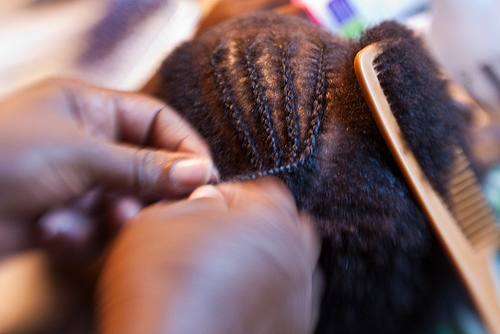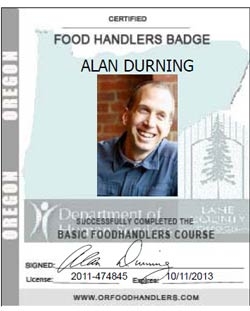I just got my Oregon Food Handler’s Badge. It took 52 minutes online and cost $10. Now I can work legally in Oregon restaurants!
If, however, I wanted to work braiding hair African-style in Oregon, or kickboxing for prize money in Washington, or selling timeshares in Montana, or promoting concerts in Alaska, or as an athletic trainer in Idaho or as scores of other things across the Northwest, I’d have to endure a more onerous licensing process.
Much more onerous.
Consider African-style hair braiding. To braid hair for money in Oregon legally, I would need (in addition to actual braiding skills—no small thing), a hairstylist or barber license. Earning a cosmetology badge requires 1,700 hours of training and classes. That’s often two years of coursework, and it costs thousands of dollars. Worse, the schooling is largely irrelevant to African-style hair braiding.
Sadly, hair braiding is not the only case where outmoded rules make it unnecessarily hard for northwesterners to pursue a livelihood. Now, during the worst recession in living memory, is an ideal time to clear away these barriers to work. And licenses to braid are a great place to start the reforms. For one thing, requiring hairstyling licenses for braiders isn’t just Oregon’s practice, it’s the norm across North America (as the Daily Show hilariously illustrated in this 2004 segment on South Carolina’s braiding rules). It’s the norm in Cascadia, too: Alaska mandates 1,650 hours of cosmetology training for braiders; Idaho and Montana, 2,000 hours.

For another thing, restricting braiding isn’t just onerous and preposterous. It may be racist. Hair braiders—most of whom are African immigrants or native-born African Americans serving African-American clients—do not cut, straighten, curl, or color hair, the skills taught in beauty schools. What hair braiders do is braid hair. They weave in extensions and decorations, in keeping with traditions that originated in Africa (the photo above is from Nigeria). Licensing keeps skilled hair braiders from legally earning a living.
In 2005, after getting served with a public-interest lawsuit from the libertarian Institute for Justice, Washington’s Department of Licensing exempted hair braiding from licensing by issuing a simple statement of clarification about its regulations. That’s how easy it can be to remove barriers to work. Oregon and other Northwest jurisdictions could do the same.
British Columbia has gone further. In 2004, legislators in Victoria—failing to see any compelling reason to continue licensing beauty workers at all—simply ended regulation of barbers, hair stylists, manicurists, and skin-care estheticians.
De-licensing did not mean the end of training and standards. The BC Beauty Council, a trade association, immediately began offering voluntary certification to salon workers, and most of them continued to seek it. The difference is that customers can decide for themselves if they care about the Beauty Council seal of approval. In the age of Yelp and other social media ratings, state licensing of hair cutters no longer makes sense, if it ever did.
The legitimate purpose of occupational licensing is to protect the interests of the community from ill-trained, inexperienced workers behaving badly. We want to make sure, for example, that midwives, bridge engineers, and pesticide applicators know what they’re doing. Any of them can cause lasting, far-reaching harm. Just so, we want to know that food handlers understand how to keep the food supply free of salmonella and other food-borne illnesses, which kill thousands of people in North America each year. (I, for one, think getting a Food Handler’s Badge should take much more than 52 minutes!)
Reasonable people can disagree about exactly where to draw the line between state licensing and occupations regulating themselves. Construction laborers don’t currently need to secure licenses, nor do mechanics, janitors, couriers, carpenters, event planners, receptionists, painters, waiters, stone masons, or cooks. (And neither do the executive directors of nonprofit public policy centers!) Some of these occupations have associations and training regimes that offer certification and credentials on a voluntary basis, but they are not legally required. Accountants, medical doctors, and attorneys, on the other hand, have official sanction to back up their own professional self-regulation. State bar associations, not states, administer bar exams, yet, states enforce the standards.

Over the years, the line has tended to migrate toward more state licensing, such that perhaps 10 percent of all jobs in the United States are governed by occupational licensing, according to the Institute for Justice. What share of those occupational licensing requirements are unneeded isn’t clear to me, but at a minimum, braiding hair should not require a license. The same goes for athletic training, kick boxing, and selling time shares. Likewise, is there any legitimate public purpose served by Washington licensing auctioneers? Telephone solicitors? (You can find more examples of Cascadian licensed occupations here: Alaska, British Columbia, Idaho, Montana, Oregon, and Washington.)
I suspect the reason for the growth of licensing is not protecting the public interest but, rather, protecting the private interests of those workers who have already got their licenses. Seattle attorney Jeanette Petersen describes the pattern:
Typically, licensing boards are comprised of members of the regulated profession, with the coercive power of government at their disposal. As a result, licensing requirements often exceed valid public health and safety objectives, and instead are used to reduce competition threatened by newcomers. As economist Walter Williams observes, these laws and regulations “discriminate against certain people,” particularly “outsiders, latecomers and the resourceless,” among whom members of minority groups disproportionately are represented.
Nobel Prize winning economist George Stigler would recognize this pattern as an instance of regulatory capture. Washington’s statutes give authority over beauty occupations to a Cosmetology, Barbering, Esthetics, and Manicuring Advisory Board. By law, the board must include nine members: one unaffiliated consumer and eight representatives of segments of the trade. This isn’t just foxes guarding hen houses, it’s the state passing a hen house law that reserves eight of nine posts on the Hen House Council for foxes.
These cartel-like politics are what lies behind outrageously divergent licensing rules: 1,600 hours of instruction to get a hair-cutting license in Washington, for example, but only 130 hours to become an Emergency Medical Technician. In fact, you can earn certification as a fire fighter in Washington after just 385 hours of coursework—one-fourth the time it takes to become a stylist. And, as I said at the outset, it takes 1,700 times as long to win legal permission to braid hair in Oregon as it does to get a Food Handler’s Badge.
Still, Cascadia is not the worst example of worker licensing. Louisiana licenses florists. Florida and Nevada license interior designers. And our region already has a reform leader in its ranks. British Columbia stands out among Canadian provinces in de-licensing. It has shifted not just beauty workers but many other trades from official licensing to voluntary certification. That kind of streamlining is exactly what other Northwest jurisdictions can do to clear barriers to gainful employment.
Sadly, legalizing African-style hair braiding, deregulating kickboxing, and otherwise pruning the excesses of occupational licensing in Cascadia is not going to be enough itself to wipe out double-digit unemployment or revive family income growth. A thorough pruning might, however, help thousands of Northwest workers each year, and, in times like these, that’s an opportunity too big to ignore.


Comments are closed.